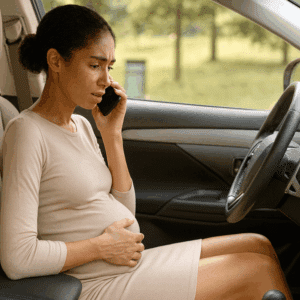Being in a low-impact car accident while pregnant can feel overwhelming and frightening, even when the collision seems minor. Your mind immediately races to your baby’s safety, and you might wonder if that small bump or fender bender could have serious consequences. While most low-speed accidents don’t cause significant harm to mother or baby, it’s crucial to know exactly what steps to take and what warning signs to watch for.
The good news is that your body is designed to protect your growing baby, and the uterus provides excellent cushioning during minor impacts. However, any car accident during pregnancy requires immediate attention and careful monitoring, regardless of how minor it may appear. Understanding your options, knowing when to seek medical care, and being aware of your legal rights can help you navigate this stressful situation with confidence.
What Should I Do If I Get in a Car Accident While Pregnant?
The moments immediately following a low-impact car accident while pregnant are critical. Your actions can significantly impact both your health and your baby’s wellbeing, so it’s important to stay calm and follow a systematic approach.
Immediate Steps at the Scene:
First, assess yourself for any obvious injuries. Even if you feel fine, avoid making sudden movements that could worsen potential injuries. If you’re able to safely exit the vehicle and there’s no immediate danger, move to a safe location away from traffic.
Call 911 immediately, even for minor accidents. Emergency responders are trained to handle pregnant accident victims and can provide an initial medical assessment. When speaking with the dispatcher, make sure to mention that you’re pregnant so they can dispatch appropriate medical personnel.
Document Everything:
While waiting for help to arrive, if you’re physically able, begin documenting the scene. Take photos of vehicle damage, the accident location, and any visible injuries. Exchange insurance information with the other driver and get contact information from any witnesses. This documentation will be valuable for both insurance claims and potential legal proceedings.
Seek Medical Attention:
This cannot be emphasized enough – see a healthcare provider immediately, even if you feel completely fine. Some pregnancy-related complications from car accidents don’t show symptoms right away. Your doctor may want to monitor your baby’s heart rate, check for signs of placental abruption, or perform other tests to ensure everything is normal.
Your search for help ends here. Let’s get started, for FREE.
How Do I Know If My Baby Is OK After a Car Accident?

Warning Signs to Watch For:
- Vaginal bleeding or spotting
- Severe abdominal pain or cramping
- Contractions or rhythmic pain
- Fluid leaking from the vagina
- Changes in the baby’s movement patterns
- Dizziness, fainting, or severe headaches
- Back pain that’s different from normal pregnancy discomfort
Medical Monitoring:
Your healthcare provider will likely perform several tests to assess both your condition and your baby’s health. These may include:
- Fetal heart rate monitoring
- Ultrasound examination
- Blood tests to check for internal bleeding
- Physical examination for signs of trauma
- Assessment of uterine contractions
Most doctors recommend monitoring for at least a few hours after even minor accidents, as some complications can develop gradually. If you’re in your third trimester, this monitoring becomes even more critical due to increased risks of placental complications.
Is It Okay to Be in a Bumpy Car While Pregnant?
Many expectant mothers worry about the effects of normal driving conditions on their pregnancy, especially after experiencing a low-impact car accident while pregnant. Understanding what’s normal versus concerning can help ease anxiety.
Normal Vehicle Movement:
Regular driving over typical road conditions – including occasional potholes, speed bumps, or minor road irregularities – is generally safe throughout pregnancy. Your baby is well-protected by amniotic fluid, which acts as an excellent shock absorber for normal bumps and vibrations.
When to Be Concerned:
However, there are situations where you should be more cautious:
- Driving on severely rough terrain for extended periods
- Off-road driving or four-wheeling
- Any activity that causes significant jarring or bouncing
- Long trips without adequate rest stops
Post-Accident Sensitivity:
After being in even a minor car accident, you might find yourself more sensitive to normal driving motions. This is completely normal and usually temporary. However, if you experience any discomfort while riding in a car after an accident, don’t hesitate to discuss it with your healthcare provider.
Your Legal Rights: What Is the Average Settlement for a Car Accident While Pregnant?
Understanding your legal rights after a low-impact car accident while pregnant is essential, as pregnancy can complicate both medical care and legal proceedings. While every case is unique, knowing what factors influence settlements can help you make informed decisions.
Factors Affecting Settlement Amounts:
Settlement amounts for pregnant car accident victims vary widely based on several factors:
- Severity of injuries to both mother and baby
- Long-term medical complications
- Lost wages due to bed rest or medical appointments
- Emotional distress and pain, and suffering
- Future medical expenses related to the accident
- Impact on the pregnancy and delivery
Special Considerations for Pregnant Victims:
Pregnancy adds complexity to car accident cases because medical care must account for two patients – mother and baby. This often means more frequent medical appointments, specialized tests, and potentially modified treatment plans that could affect settlement values.
Courts recognize that pregnant women may require ongoing monitoring even after minor accidents, and this extended medical care should be factored into any settlement discussions.
When to Consult an Attorney:
Consider speaking with a personal injury attorney if:
- You’ve suffered any injuries requiring medical treatment
- There are concerns about your baby’s health
- The other driver was clearly at fault
- Insurance companies are offering inadequate compensation
- You’re facing significant medical expenses
Shuman Legal offers free consultations for car accident cases and can help you understand whether you have grounds for a claim.
Medical Complications and Long-Term Monitoring
Even after a low-impact car accident while pregnant, some complications may not become apparent immediately. Understanding potential risks can help you stay vigilant and seek appropriate care.
Placental Abruption:
This serious condition occurs when the placenta separates from the uterine wall prematurely. While rare in minor accidents, it can happen hours or even days after impact. Symptoms include severe abdominal pain, back pain, and vaginal bleeding.
Preterm Labor:
Car accidents can sometimes trigger preterm labor, especially in the third trimester. Watch for regular contractions, pelvic pressure, and lower back pain that comes and goes in a pattern.
Monitoring Throughout Pregnancy:
After any car accident during pregnancy, your healthcare provider may recommend:
- More frequent prenatal appointments
- Additional ultrasounds to monitor baby’s growth
- Non-stress tests to check baby’s heart rate
- Close monitoring of blood pressure and other vital signs
Your search for help ends here. Let’s get started, for FREE.
Preventing Future Accidents
While you can’t control other drivers, there are steps you can take to reduce your risk of future accidents during pregnancy.
Safe Driving Practices:
- Always wear your seatbelt properly positioned
- Adjust your seat to maintain an adequate distance from the steering wheel
- Avoid driving when feeling dizzy or fatigued
- Take frequent breaks on long trips
- Consider having someone else drive during late pregnancy
Seatbelt Safety:
Proper seatbelt use is crucial during pregnancy. The lap belt should sit under your belly, across your hips, and pelvic bone. The shoulder belt should cross between your breasts and to the side of your belly, never across your stomach.
Insurance and Documentation
Dealing with insurance companies after a low-impact car accident while pregnant requires careful attention to detail and thorough documentation.
Medical Documentation:
Keep detailed records of all medical appointments, tests, and treatments related to the accident. This includes regular prenatal visits that may have been affected by the accident, as pregnancy-related medical care can be more expensive and complex.
Communication with Insurance:
When speaking with insurance adjusters, be honest about your pregnancy and any concerns you have. However, avoid giving detailed statements without consulting with an attorney first, especially if there are any complications.
Related Article(s)
Special Damages vs General Damages: Key Differences Explained















